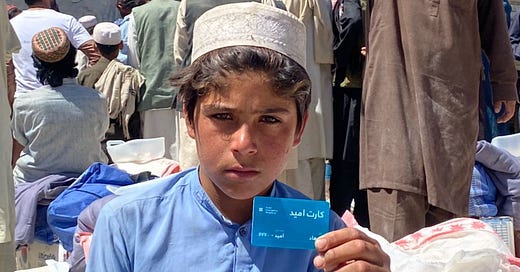Afghan startup confront challenges of international aid after severe earthquake
After a record breaking earthquake struck three provinces in Afghanistan I followed up with Afghanistan-based and remote startup ASEEL on latest updates

Taylor Simone: A group of ASEEL staff and volunteers are on location responding to a deadly earthquake in Southeast Afghanistan namely Paktika, Paktia, and Khost. Can you tell me what is happening?
Mohammad Nasir Meerkhil:
[Technical lead and emergency response for ASEEL]
Yesterday, ASEEL team reached Paktika after nine hours of travel. They travelled to four villages. All the villages and houses had been demolished there was nothing left for the families. ASEEL team interviewed a few families who lost everything. Some families are injured the situation is very difficult.
NGOs are trying to help as much as they possibly can. ASEEL has started initial distribution of food packages and supplies. Right now, current need is shelter, food, and water. These are requirements for families who are left alive. Those who are injured in Paktika are being moved with helicopters as the locations are difficult to reach with ambulances. Later on, government and organizations will provide relief and cash to ensure those impacted are able to rebuild their houses and lives.
TS: Are NGOs having difficulty accessing regions impacted by the earthquake?
MNM: Yesterday, the government openly invited international partners and NGOs to use all means, efforts, and support to families devastated by the earthquake —no one is banned or prohibited from helping. Last night our team received a tent to work. We have four staff members and three volunteers on location who are delivering food packages to the families.
TS: In terms of ASEEL’s recently launched emergency earthquake relief campaign what is your team in need of with supplies: food packages, water? What is ASEEL staff and volunteers on the ground saying?
MNM: Right now, there are three critical aspects: health services, food, and access to shelter. ASEEL is active in two of those categories, food and shelter. We’re providing food packages, tents, blankets, and hygiene products. A food package can sustain a family for a few weeks.
TS: After nearly a year of sanctions in Afghanistan what is the next step in humanitarian relief? What should the international community be aware of with this earthquake that has struck Afghanistan?
MNM: I’ve heard US and other countries have expressed support and are teaming up with international and NGO partners such as WHO and IRC to provide support for impacted families. I was told India has offered shelter support as well those supplies reached Kabul last night. Pakistan has offered relief efforts as the provinces impacted are close to the border many are being transferred to hospitals in Pakistan.
TS: What communication is happening with Taliban? Since Taliban is in a governing role is there evidence of offering support?
MNM: Taliban remain heavily dependent on international aid. I don’t know how dedicated they will be with humanitarian crisis. Recently, Taliban mentioned approximately 2 million Afghanis will be provided for relief efforts. They recently received 900 million from United Nations. But that money won’t reach the direct hands of the government the money is directed to beneficiaries. There is still a lack of transparency on what is happening with financial international aid — Currently, United Nations isn’t being transparent with the public. When there is a lack of transparency there will be challenges in ensuring beneficiaries are the ones receiving aid.
TS: Besides donating to ASEEL what are ways people can help?
MNM: People can create their own campaigns for crowdfunding on the website they can share with friends and networks. We will dedicate those funds to grand challenge for earthquake relief in Afghanistan. ASEEL team on location are able to identify those beneficiaries and distribute the packages. If donations or starting campaigns are not viable raising attention on social media can help. Creating posts, tweeting, and sharing ASEEL’s work helps communicate the situation to the rest of the world.
Since yesterday, ASEEL updates regularly by the hour.
TS: According to ASEEL staff and volunteers on the ground have they seen many international media outlets on location?
MNM: ASEEL staff and volunteers are receiving calls from multiple media outlets for updates on what is going on, how many families are impacted, how many are injured, and how many lives have been lost. Since those on the location are receiving many calls it seems not many outlets have reached areas hit by the earthquake yet.
Right now, international media is trying to get connected with the locals.



